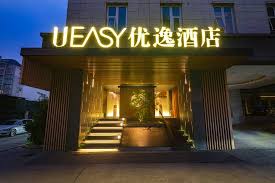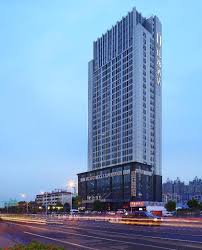Chinese brands to become biggest beneficiaries after Covid-19: Haoping Jiang

Beijing: With countless hotel brands wiped out in China and other countries during the Covid-19 pandemic, the post-crisis business opportunities can also be anticipated, said Haoping Jiang, Co-Founder of UEASY/UFUN Hotels.
“In my opinion, Chinese and Pakistani companies can work together to grasp the opportunities to share the benefits, Haoping Jiang said on Monday.

Covid-19 epidemic in 2020 was the largest epidemic virus event since the Spanish Flu, in which about one billion people were infected and 2.5-5% of the world’s people died. As a result, after a year has passed, countries in the world have not yet resumed normal economic trade and population movement, he said in an interviews.
He said that the service industry undoubtedly hit the hardest, hotels being the first to be affected.
This is a big black swan that Chinese brands have encountered in their rapid rise. Meanwhile, the Chinese market is also experiencing the innovations of the Internet, communication technology, artificial intelligence (AI), big data and other technologies.
A hundred years later, pre-epidemic era and post-epidemic era may be used to record the historical changes in the history of Chinese hotels.
Haoping Jiang informed that the service industry accounts for about 70-80% in the developed European and American countries, but China did not exceed 50% until 2015.
In other words, despite China’s excellent performance during the epidemic, European and American countries still took a far harder hit than China even if the epidemic had the same impact on countries around the world.
China beat other countries to recovery in the post-epidemic era and the technological revolution accelerated the process, it is fair to consider this moment as an inflection point for global service industry.
Haoping Jiang said, “as a founder resolved to create a Chinese hotel brand to be remembered, we are lucky to witness the history and share some ideas with our peers. He observed that the companies go through several stages of development. The first stage is price competition. Companies gain access to a market by selling similar products at a lower price. This is the most initial stage of market competition.
The second stage is product competition. Companies enhance their product superiority to gain competitiveness and markets in the competition of similar products; Chinese companies are generally at this stage. The third stage is brand competition.
Companies provide products of different and standard brands with their product power to obtain the recognition of the market consumers. Many companies in China have begun to make huge profits at this stage. The fourth stage is culture competition. Companies build a unique culture with their own efforts, and also contribute to the development of the industry.
A company can be larger in the first two stages, stronger in the third stage, and longer in the last two stages.
He said that many companies can think about building their own style and culture in business and making contributions to the industry. Only planning for the long term with strategic thinking can a company become the irreplaceable choice of consumers.
“In the coming long time, we will take the opportunities to make intensive studies with our partners in these industries, and we also welcome more like-minded friends to join us,” he said.





